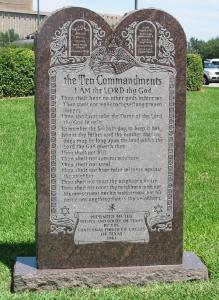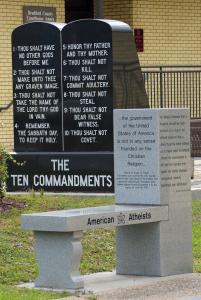(Lectionary for March 4, 2018)
 Some years ago I stood in front of a huge marble monument centered at the head of an aisle, leading to the front of a beautifully shaped Christopher Wren chapel, strangely sited on the campus of Westminster College in Missouri. It was peculiar enough to find a Wren chapel in rural Missouri, but when I discovered that the chapel rested over a museum dedicated to the life and work of Winston Churchill, its presence was at least in part not so odd. As I gazed at the monument, in fact a looming stone recreation of the Ten Commandments, I immediately saw that something was missing from the list of the famous Ten. The first line of the so-called first one was absent. The list did not begin with “I am YHWH your God,” but instead started with “You shall have no other gods before me.” Is that not strange, I thought?
Some years ago I stood in front of a huge marble monument centered at the head of an aisle, leading to the front of a beautifully shaped Christopher Wren chapel, strangely sited on the campus of Westminster College in Missouri. It was peculiar enough to find a Wren chapel in rural Missouri, but when I discovered that the chapel rested over a museum dedicated to the life and work of Winston Churchill, its presence was at least in part not so odd. As I gazed at the monument, in fact a looming stone recreation of the Ten Commandments, I immediately saw that something was missing from the list of the famous Ten. The first line of the so-called first one was absent. The list did not begin with “I am YHWH your God,” but instead started with “You shall have no other gods before me.” Is that not strange, I thought?
Well, I discovered some years later, as I worked on a book about the Ten Commandments in a series I was editing called “The Great Texts,” this lacuna was not at all unusual. Many lists of the Ten Words, as the Hebrew text names them, leave off the first words of the list. For example, the Westminster Catechism, used by millions over the centuries, does not include what Judaism called the First Commandment. Here is what was left out: “I, YHWH, am your God, who brought you out of the land of Egypt, from the house of slavery” (Ex.20:2 and Deut.5:6). After I reflected on this omission, I finally concluded that the loss was a serious one. In fact, it is this loss that may have led so many believers over the years to imagine that Judaism was in the final analysis merely a religion of law, while Christianity was a religion of grace. That law/gospel split is a false one and has always been false. Judaism never was and still is not a religion based in law; grace stands at its very heart, and a proper appreciation for the real first commandment will make that plain.
I have dealt with the Ten on other occasions in this blog, and I want to reiterate what I have always said at the beginning of my thoughts about this famous list. No preacher can take on all ten in one sermon. I have heard a student or two attempt this feat and have witnessed each time a terrible, and terribly boring, failure to do so with any effectiveness. Each commandment deserves its own sermon, so I urge you preachers to set aside ten full Sundays for a proper engagement with the Ten Commandments. I know this is 2 1⁄2 months of sermon time, but since very few of the Bible’s texts have been more woefully misrepresented than these have, surely the time may be well spent. The truth is that more of your congregants know about the political struggles to place some representations of these ten on school room walls and in public parks than they do about what they actually say. Hence, some serious time with them, one at a time, would not be amiss.
I turn then today to the real first commandment. I quoted it above: “I, YHWH, am your God, who brought you out of the land of Egypt, from the house of slavery.” Of course, any one who knows English (or Hebrew) can immediately recognize something about this sentence; it is obviously not a commandment at all! It is a statement, a claim, an announcement of a truth and reality concerning the God of Israel. In the same way that the entire Bible story begins with an announcement about the universal creative power of YHWH, not pausing to question that power, nor seeking to prove it in any way, so the Ten Commandments begin with a foundational claim about who this YHWH is. This YHWH is the God who frees slaves, who commands freedom for those in bondage, who actively seeks to break the chains of those who are oppressed. And because that is the God with whom we deal and wrestle and whom we love, the following demands that God makes on us have real weight and force.
You must have no other gods before this God, because this God is the God who has offered you freedom from all your shackles. You must make no images of this God, because you may thereby confuse the real God of freedom with some block of wood or some marble statue. And on the list goes, each subsequent command referring back to this first claim in one way or another. You must not kill, because to take life is to deny YHWH’s freedom as the giver of life. You must not commit adultery, because if you abuse another man’s marriage, if you take advantage of another woman’s freedom, you denigrate and reject the freedom that YHWH has given both you and them. If you fail to tell truth in the court, you belittle the freedom provided by truth, and you refuse to accept the freedom from YHWH that that truth offers to you and to the community.
The real first commandment is the touchstone of the entire list; without it the list becomes a ledger of legal demands, but with it heading the list, the subsequent commands are rooted in the grace of the freedom of YHWH. To take the Ten Commandments with great seriousness is to take YHWH’s gift of freedom with great seriousness.
It is finally impossible to overestimate the significance of this opening statement. In at least 130 places in the Hebrew Bible, in 30 of the 39 books of that corpus, we are reminded that “YHWH brought Israel out of Egypt.” And because that claim is the most basic one that is given for the character of the God of Israel, namely that YHWH frees us, the first commandment concludes with the bald statement that “there must not be for you other gods before my face” (a quite literal rendering). This last phrase could also be translated “you must not possess other gods,” since the grammar suggests a possessive meaning. And a further quite intriguing translation could be “you must not become other gods,” since the grammar permits even that. That latter reading recalls the snake in the famous garden of Gen.3, who promises the woman that if she eats from the forbidden tree of the garden, “she shall become a god (or “like God”), knowing everything.” Is it possible that also here the first commandment warns us that our desire for divine knowledge can lead us to make ourselves into gods? If that is a possible translation, then again the real first commandment is under assault; only YHWH is God. We cannot become gods of any sort.
There is much in these few words for a preacher to contemplate. I urge you to take on a series of the Ten Words. You will be energized and your congregation will find new and rich meanings in these old and infamous words. (Images from Wikimedia Commons)











